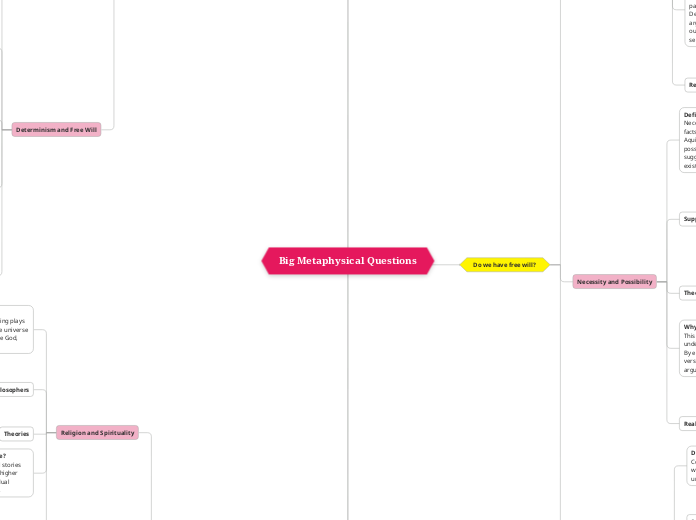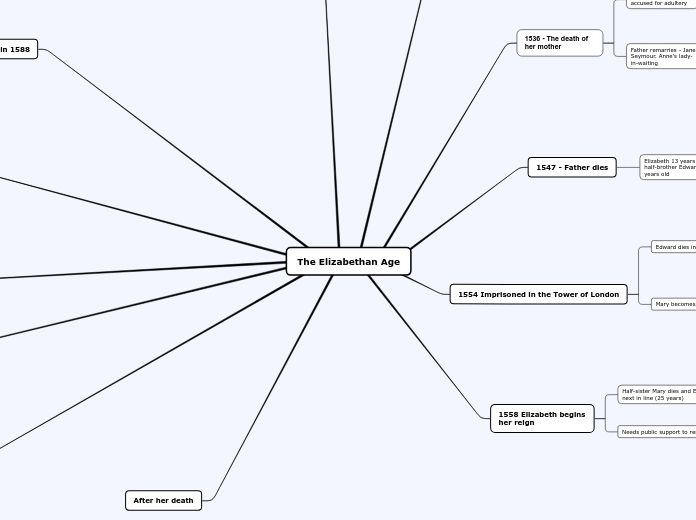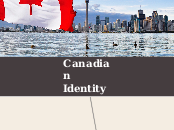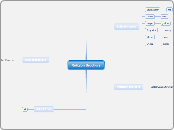Big Metaphysical Questions
Does God Exist?
Novels - Novels often feature protagonists choosing between predetermined paths and their desire to choose differently, highlighting the complexity of human decision making.
Why is this an appropriate pathway to knowledge?
This abstract examines how the universe works and if a divine being controls it. If everything is predetermined, it could suggest that God planned it all. But if we have free will, it raises the question about God's role and how much freedom we are given. This makes determinism and free will a key topic for understanding the existence and influence of a higher power.
Compatibilism
Board/Video Games - Some games are designed with themes that challenge players to navigate worlds governed by rules of necessity and possibility, allowing for understanding of these concepts through gameplay.
Why is this an appropriate pathway to knowledge?
By differentiating between what necessarily exists across all possible worlds and what could exist in some, it sets the stage for arguments like St. Thomas Aquinas', which uses the idea of necessary existence to argue God's presence.
Cosmological Argument
Form of argument used in natural theology to prove the existence of God
Real Life Situations:
Music - Many musicians have used religious and spiritual themes in their work to express quests for meaning, comment on social issues or explore personal journeys.
Why is this an appropriate pathway to knowledge?
Religion and Spirituality provides teachings, personal stories and deep thinking to help us understand if there is a higher power. They offer both traditional wisdom and individual experiences that point towards the existence of God.
Fideism
Faith must be held without the use of reason or even against reason
Hume
Kierkegaard
What is the meaning of life?
Video Games - Some games offer storylines based on player choice, directly engaging with the concept of free will versus determinism and allowing players to explore the concequences of their decisions.
Why is this an appropriate pathway to knowledge?
Determinism and free will examines whether our lives are predestined or shaped by our choices. This question helps us to understand our influence over life's direction, impacting our perception of life's purpose. If determinism is true, our life's meaning could be seen as a larger, unchangeable plan. If free will is true, it suggests that the meaning of life is linked to our personal decisions and actions, therefore highlighting the idea that our individual choices craft a meaningful existence.
Determinism
All events in the universe, including human decisions and actions, are causally inevitable
individuals or groups to believe that their destinies are ruled by an unseen power or are played out inevitably rather than by their will
Identity and Change
Self-help and Personal Growth Blogs - These blogs often
discuss how understanding and embracing one's identity while also being open to change can lead to personal growth, improved mental health and a more fulfilling life. They might use real life stories or theories to highlight the importance of self-awareness.
Educational Memes - Memes, especially those that are shared on social media, can capture the essence of identity or change. For example, a meme might humorously portray how people's preferences or behaviours have evolved over the years (ex. fashion trends, technology use, etc.), encouraging reflection on personal growth and change.
Why is this an appropriate pathway to knowledge?
Exploring Identity and Change helps answer the question "What is the meaning of life?" by looking at what makes life unique and how it changes. Identity shows us what life is at its core, while change shows us how life grows and evolves. This helps us to understand that the meaning of life can change and encourages us to keep exploring and adapting as we go through life.
Law of Causality
whatever happens (action) or whatever is (being) must have a cause, of which that happening or being is the effect
Law of Identity
Everything that exists has a specific nature
Leibniz
Aristotle
Definition of Abstract:
Identity is what makes an entity distinct and recognizable, essential for its existence as per Aristotle's Law which states that a thing must exist as something specific or else it would not exist at all. Change is any alteration to an entity's identity. This requires a cause to act on an entity, leading to an effect.
Real Life Situations
Philosophical Questioning - The act of questioning
your own existence or consciousness ("Am I aware? Do I
exist?") paradoxically confirms it. Engaging in the process
of doubt or thought requires the operation of consciousness,
affirming its existence. "I think, therefore I am".
Astronomical Discoveries - The discovery of planets and stars, which existed way before humans were aware of them, this supports the abstract of existence and consciousness. These things did not begin to exist when we discovered them or our consciousness of them began . This shows that existence is independent of our awareness.
Why is this an appropriate pathway to knowledge?
This abstract emphasizes that before we can answer the big metaphysical question "What is the meaning of life?", we must understand existence and consciousness. Understanding existence and consciousness will prove that life's meaning is a journey explored by those who are aware of their own being and their capacity to question, reflect and find purpose.
Supporting Philosophers
Locke
Leibnez
What is our place in the universe?
Documentaries - Many documentaries explore religious beliefs and spiritual practices around the world, showcasing how these beliefs shape people and cultures.
Why is this an appropriate pathway to knowledge?
Religion and Spirituality offer beliefs and experiences that connect us to something bigger. They provide ideas about why we are here and how we fit into the larger picture, giving us a sense of purpose and belonging in the universe.
Humanism
A doctrine, attitude, or way of life centered on human interests or values
Deism
Nietszche
Space and Time
Science Fiction Stories and Films - These often explore
theoretical concepts of time and space, such as time travel, parallel universes, etc. to question our understanding of the universe and our place within it.
News Reports on Space Exploration - Media coverage of space
missions, discoveries, etc. uses concepts of space and time to highlight human achievements and the ongoing quest to understand our place in the universe.
Why is this an appropriate pathway to knowledge?
Exploring the concepts of space and time provides a pathway to understanding our place in the universe because these concepts are important to how we perceive our existence. Space and times frame our understanding of the universe's vastness and our position within it. By questioning space and time, whether they are independent realities or mental constructs, we dive deeper into questions about the nature of reality and our roles within it.
Principle of Relativity
Space and time are neither ideal objects nor forms of order necessary for the human mind
Absolutism
The acceptance of or belief in absolute principles in political, philosophical, ethical, or theological matters.
J.M.E. McTaggart
Albert Einstein
Isaac Newton
Definition of Abstract:
The abstract explores the perception of time, noting how it can seem to speed up or slow down based on our experiences, and poses questions about the nature of time and space. It contrasts the Realist view, which sees time and space as existing independently, with Idealist perspectives that consider them mental constructs. It also touches on the existence of times beyond the present and how our identities change over time, challenging our understanding of these concepts and their impacts on our lives.
Works of art - Artists sometimes use cosmology and cosmogony to inspire works that reflect on the universe's beauty and the human desire to understand our origin and destiny.
Why is this an appropriate pathway to knowledge?
This abstract offers important insight into "what is our place in the universe?" by exploring the universe's origin and structure. Cosmology and Cosmogony help us understand the cosmic context of our existence, revealing our connection to the universe's vastness. By discovering how the universe began and how it operates, we gain perspective on our role within it.
Belief in God based on reason rather than revelation or the teaching of any specific religion
Do we have free will?
Cosmology and Cosmogony
Podcasts - Science and philosophical podcasts may have discussions on Cosmology and Cosmogony to explore broader topics, including how understanding the universe's origin may influence our perception of free will.
Why is this an important pathway to knowledge?
This abstract provides an indirect but important pathway to exploring the question of free will by examining the universe's laws and its origin. Cosmology and Cosmogony help us to understand whether the universe operates on fixed rules. If so, then it would be implied that all events (including human actions) are predetermined.
Theology
Diesem
The study of the nature of God and religious belief.
Voltaire Plotinus
Definition of Abstract:
Cosmology is the study of the universe's structure and history, while cosmogony focuses specifically on theories about the universe's origin.
Necessity and Possibility
Motivation Speeches and Self-Help Content - Speakers and authors in the self-help genre sometimes explore the concepts of necessity and possibility to inspire personal growth and change.
Why is this an appropriate pathway to knowledge?
This abstract is beneficial because it sets groundwork for understanding reality, which aids discussions about free will. By explaining concepts like what must be true in all situations versus what could be true in some, it helps frame the argument on whether our choices are ours or predetermined.
Quantum Mechanics
The study of matter and its interactions with energy on the scale of atomic and subatomic particles
Modal Realism
A claim about how things could be or must be given some constraints
Aristotle
Thomas Aquinas
David Lewis
Definition of Abstract:
Necessary facts are true in all possible worlds, while possible facts are true in some but not necessarily all. It uses Thomas Aquinas' argument for God's existence, stating that if it were possible for nothing to exist, then nothing would exist now, suggesting the necessity of God as the initial cause of existence.
Determinism and Free Will
TV Shows - Many stories in TV shows explore characters struggling with destiny vs choice, using these themes to delve into questions of morality and fate.
Why is this an appropriate pathway to knowledge?
This abstract answers the question "do we have free will?" by looking at whether our actions have already been decided by past events or if we can make up our own choices. Determinism says that our choices are fixed while free will argues we can choose freely. This discussion helps uf figure out if we're really in control of our decisions or just following a set path, showcasing our personal freedom and responsibility.
Fatalism
Individuals or groups to believe that their destinies are ruled by an unseen power or are played out inevitably rather than by their will
Compatiblism
The position or view that causal determinism is true, but we still act as free, morally responsible people who still navigate their own path
Hobbes
Spinoza
Definition of Abstract:
This abstract contracts determinism, which says that all events are predetermined, with free will, the idea that we can make our own choices. Compatibilists believe in a mix of both, suggesting that our path is set but we can choose how to navigate it.
Do humans have a soul?
Objects and Their Properties
Academic Lectures - Presentations in philosophy and cognitive science might use the relationship between objects and their properties to support arguments or theories about the nature of reality.
Why is this an appropriate pathway to knowledge?
Studying objects and their properties helps us to tackle the question "do humans have a soul?" by letting us compare physical things that we see with abstract ideas like the soul. This approach asks if the soul is a unique part of humans, separate from the body, guiding us to think deeply about what makes us who we are.
Objecthood
The condition of being an object, or the object condition
Pragmatism
Thinking of or dealing with problems in a practical way, rather than by using theory or abstract principles
Alfred Edward Taylor
Russell
Definition of Abstract:
This abstract discusses the study of objects and their properties, focusing on physical objects (like sweaters and mailboxes) as well as abstract concepts (like happiness). It introduces the idea of "universals" or properties" that these objects share, regardless of their physical or abstract nature.
Existence and Consciousness
Artifacts and Fossils - The discovery of ancient artifacts and
fossils prove that objects and beings existed way before we became aware of them through discovery. Their existence precedes our awareness of them, highlighting the idea that things exist independently of our consciousness.
Dreaming - upon waking up from a dream, you might
question the reality of the dream experience. But, the ability to reflect on the dream and question its reality or your awareness within the dream confirms the presence of consciousness during the dream and upon awakening.
Why is this an appropriate pathway to knowledge?
Theories
Ontology
Investigating the Nature of Being
Epistemology
The theory of knowledge, especially with regard to its methods, validity, and scope.
Chalmers
Nagel
Decartes
Definition of Abstract:
Existence and consciousness are self-evident truths
Existence is the state of being and consciousness is the awareness of that state. This self-evidence suggests that doubting one's consciousness or existence contradicts the very act of doubting, as it utilizes the mind. As well as the idea that things must exist first before they can be perceived, which highlights the connection between being and awareness.
Religion and Spirituality
Real Life Situations
Books and articles on spirituality and philosophy examine the impact of religious beliefs in personal and societal levels. They often argue for the importance of spirituality in understanding human nature.
Why is this an appropriate pathway to knowledge?
Religion and Spirituality offer insights into the soul's purpose and its connection to a higher power. This abstract also affirms the existence of the soul through teachings, practices and experiences.
Theories
Atheism
A denial of God or of the gods
Monotheism
Belief that there is only one God.
Supporting Philosophers
McCord Adams
Hume
Definition of Abstract:
Religion and spirituality explores whether a divine being plays an active role in the world (Theism) or just started the universe and left it (Deism), and questions the existence of one God, many Gods, or no Gods at all.









